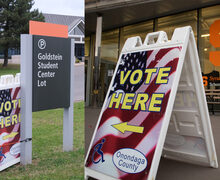SU students turn to apps for tips on where to find parties in real time
Alex Archambault | Asst. Feature Editor
People congregate outside of Zeta Beta Tau Fraternity house on campus for a party.
Dating, ordering food and networking have all moved online. So, too, has the search for a good time.
Apps such as Toga, Yik Yak and Make Moves are now in use at Syracuse University, giving students another way to find parties.
“It really broadens your exposure of parties you can go to,” said Chase Packard, creator and CEO of the social app Make Moves. “You never have to rely on word-of-mouth.”
The idea for Make Moves came to Packard after he spent a night driving around with his friend, unsuccessfully looking for parties. It wasn’t until morning that Packard realized there were plenty of parties hosted by friends of friends that he could have attended had he heard about them.
“I thought there should be an easy way to see and hear about parties and an easy way to organize them on your phone,” Packard said.
From that, Make Moves was born.
Packard said the app is relatively simple to use. It lists parties by geographic location and by chronological order. Under each event, there’s a live photo and video in addition to features such as gender ratios.
The app exists “so you know what party to go to,” Packard said.
Make Moves relies on an active student-user population. But larger, less specialized apps such as Yik Yak have also become places to advertise and find parties.
“Yik Yak is a great way to bring people together,” said Olivia Boger, a spokeswoman for Yik Yak.
Not all students have embraced these apps, and those in the Greek life community at SU are actively discouraged from using them, said sophomore television, radio and film major Matthew Schiff, who served as his fraternity’s social chair last year.
“The reason I don’t like or use those apps is because there is so much regulation with Syracuse Greek life already that promoting these events on apps could make it easier for parties to get shut down,” he said.
Schiff added that most students in fraternities and sororities already know about the parties their brothers and sisters plan to attend.
Packard said he has noticed that members of Greek organizations don’t use his app as often as other students. He agreed with Schiff, and said this also relates to strong communication networks that already exist within the Greek system. But he thinks there’s more to it.
“Greek life didn’t really want to put their events on any type of Internet forum because of the increased amount of attacks on Greek life by various social justice groups,” Packard said.
Packard said his app has done best on campuses with little to no Greek presence, something that doesn’t surprise Schiff.
“When you are having a party with another sorority or fraternity, both parties are aware you are having a party that night, so you don’t need to go on an app and see that there is a party,” Schiff said.
The Department of Public Safety does not regularly monitor Make Moves or similar apps to hunt down parties, DPS Associate Chief John Sardino said.
“We already have a good system in place of where the parties are,” he said. “We are ahead of the curve.”
DPS does occasionally check Yik Yak and other social media apps to see if a party is growing, but not to “obtain information,” Sardino said.
“We are here to monitor potential safety risks,” he said. “So if a party is a safety risk and an app has information about it, we would probably use the app.”
Steven Sawyer, a professor in the School of Information Studies who studies new forms of information sharing, said there are downsides to using apps like Yik Yak that allow users to post messages anonymously, since it allows them to use negative speech and see how much they can get away with.
Due to the lack of attribution that comes with a lot of these apps, many students say things they ordinarily wouldn’t, Sawyer added.
“It’s like that kid from the back of the classroom when you would have a substitute teacher, and they would yell stuff in the hopes that nobody would get them in trouble,” he said.
But Sawyer also sees the upside.
“These apps connect us, make us aware of what’s going on around you,” he said. “People may be more likely to help each other out.”
Published on April 7, 2016 at 12:49 am
Contact Hanna: hrhorvat@syr.edu





